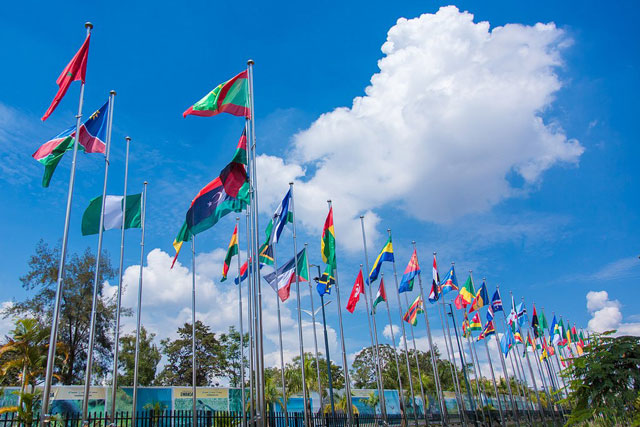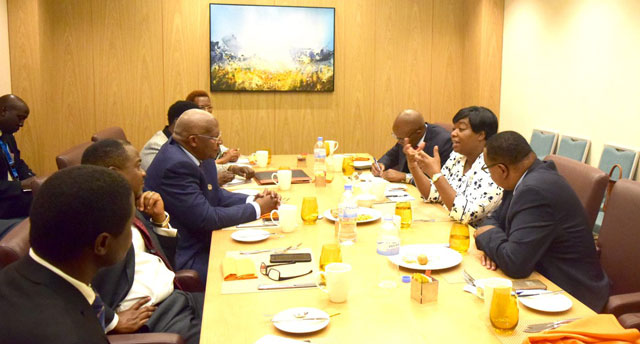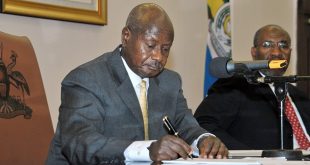
Kampala, Uganda | THE INDEPENDENT & AFP | Uganda has sent a strong delegation to Kigali where African leaders will formally launch the African Continental Free Trade Area Treaty on Wednesday, but the country is reconsidering its full involvement in the pact as it is.
Uganda, in many ways like Nigeria, will investigate concerns by a sector of the business community before making major commitments. Some 27 heads of state are expected to attend the Kigali meeting, but it is unclear who will sign on to the CFTA right away.
Minister of ICT and National Guidance Frank Tumwebaze told the press on Tuesday that Uganda’s cabinet on Monday noted the agreement establishing the African Continental Free Trade Area (AfCFTA) and therefore directed the Ministry of Foreign Affairs and that of East African Community Affairs to examine the provisions within it.
Cabinet also constituted a Cabinet Committee which would discuss how to improve Uganda’s competitiveness in the Regional Economic Community and African Continental Free Trade Area.
Foreign Affairs Minister Sam Kutesa is representing President Yoweri Museveni at the Kigali summit and is joined by Minister of Trade, Industry and Cooperatives Amelia Kyambadde, and former Uganda Investments Authority Executive Director, Prof Maggie Kigozi.
Overshadowing the launch of what they say will be the world’s largest free trade area is the decision by Nigeria to pull out, highlighting the challenge in getting the continent to sign up.
Establishing the African Continental Free Trade Area (CFTA) with 55 African Union (AU) members having a cumulative GDP of $2.5 trillion is one of the bloc’s flagship projects.
We are in Kigali to sign the Africa CFTA . We have 20 Presidents here.
— Anne.K (@AKyambadde) March 20, 2018
Buhari delay
Muhammadu Buhari, president of one of Africa’s largest markets Nigeria, this week cancelled plans to attend the Kigali launch and called for more consultations after business leaders objected to joining the world’s biggest free trade area in terms of countries.
“The signature of the CFTA is something that makes Africa look good on paper, but for implementation it’s going to have a lot of hiccups,” said Sola Afolabi, a Nigeria-based international trade consultant.
“Mr President will no longer be travelling to Kigali for the event because certain key stakeholders in Nigeria indicated that they had not been consulted, for which reasons they had some concerns on the provisions of the treaty,” the statement said.
“Consequently, Mr President’s decision is to allow time for broader consultations on the issue.”
The organised labour union, the Nigeria Labour Congress (NLC), urged Buhari not to sign the deal.
“We at the Nigeria Labour Congress are shocked by the sheer impunity or blatant lack of consultation in the process that has led to this,” said NLC President Ayuba Wabba.
“We have no doubt this policy initiative will spell the death knell of the Nigerian economy.”
Nigeria, Africa’s biggest oil producer and with a population of 190 million, is a massive market.

– Trade between neighbours –
AU trade and industry commissioner Albert M. Muchanga said Africa’s fledgling industries and growing middle class would benefit from the CFTA’s removal of tariffs.
Currently, African countries only do about 16 percent of their business with each other.
“If we remove customs and duties by 2022, the level of intra-African trade will increase by 60 percent, which is very, very significant,” Muchanga told AFP.
“Eventually, we are hoping that all the African Union states will be parties to the Continental Free Trade Area,” he added.
With underdeveloped service and industrial sectors across the continent, African countries have for decades seen their fortunes rise and fall with the prices of exported commodities such as oil, cocoa and gold.
In recent years, nations like Ethiopia and Ghana have tried to wean themselves from this cycle by building factories and new infrastructure for local industries, spurring rapid growth.
Landry Signe, a development expert with Stanford University in the United States, said the agreement could help these industries, while giving African countries a unified platform to negotiate trade deals with wealthier nations.
“With the CFTA, the manufacturing sector would be much more diversified, as the market would not be a few million people, but potentially 1.2 billion people,” he said.
South Africa, a vocal backer of the trade deal, has argued that African economies are too small to support economic diversification and industrialisation on their own.
Regional integration “is critical to reduce the vulnerability of African economies to global shocks, a vulnerability which results from their heavy reliance on commodities,” South Africa’s Trade and Industry Minister Rob Davies wrote in an editorial last week.
However in Nigeria, the plans have not gone down well with unions and business leaders.
“We have no doubt this policy initiative will spell the death knell of the Nigerian economy,” said the Nigeria Labour Congress (NLC).

– Easing trade and travel –
The CFTA is a key part of the AU’s long-term development plan Agenda 2063, which calls for easing trade and travel across the continent.
At its most recent summit in Ethiopia in January, AU member states agreed to a common air transport market that could drive down air fares, as well as plans for visa-free travel for Africans across the continent.
Which countries will adopt these agreements remains unclear, as do the prospects for the CFTA, which requires 22 ratifications at a national level after its signing to come into force.
Afolabi said countries with more developed industries would embrace the CFTA because it could open more markets, but nations whose ports served landlocked neighbours could opt out, fearing a loss of revenue.
He worked on setting up the Economic Community of West African States’s (ECOWAS) common market, which he has subsequently criticised for failing to punish countries that violated its terms.
“The regional trade agreements are not working and those are supposed to be the legs for the continental” version, Afolabi said.
“If there is no reward for compliance and there is no punishment for non-compliance, then it is going to be a very nice agreement without any teeth or any legs,” he said.
 The Independent Uganda: You get the Truth we Pay the Price
The Independent Uganda: You get the Truth we Pay the Price



SELL OUTS
ALWAYS FULL OF EXCUSES WHEN THEY HIT CLOSE TO A MILESTONE